#and also a HUGE advocate for reducing the stigma on mental health which is lovely to see ^^
Explore tagged Tumblr posts
Text
After thinking about how much I love my sister, I started thinking about how much I love my dad. Words can't describe how lucky I was to have such a loving, supportive, caring father like him. Specifically when it comes to LGBTQ+ matters. I'm also just kind of a daddy's girl at heart.
Now, he's the most Cisgender, Heterosexual male to ever walk this Earth. But he's also the most enormous ally of the LGBTQ+ community I've ever seen. So much so that he's practically waving a rainbow flag at any second. This man's support of the community is actually insane, and it gives me instant Serotonin just thinking about it. How many Cishet parents, especially coming from a country like Korea, who (even though they've gotten better about this over time) have a culture where being LGBTQ+ is still very taboo, would be as enthusiastic as he is about these matters? It warms my heart so much.
He actually gets so passionate and heated about it too. I remember one night at dinner (I can't remember the context of this), he actually said something along the lines of: "God, there are just so many people who say "marriage is only for men and women". Like why? That is so ridiculous."
My LGBTQ+ heart jumped a little in happiness at him being so outspoken about Homophobia.
But my favorite thing is how passionate of a Transgender ally he is. Even though neither my sister nor I are Trans (I'm Genderfluid AFAB and my older sister's Cisgender), he gets so adorably excited when talking about Trans people. I don't know what it is about Trans people, but he actually loves them so much? I remember one day, I was talking to him about nothing much in particular, and then the subject turned to video games. A long time ago, I got really into this Choose-Your-Own-Adventure video game series called Life is Strange, and he brought up a game that was similar to Life is Strange that he played. And he said something along the lines of:
"Well, if you play it, you'll see, but there's something super cool and interesting that happens when you get farther along. You actually find out that the main character is actually *gasps* a Trans Guy! Like he was born a girl but he's really a boy. Isn't that just the coolest thing, Doodler? I thought it was so cool. I really enjoyed that. You should play it."
And then another instance, he began talking about the two people who directed the Matrix movies, the ones with Keanu Reeves (The Wachowskis), because he recently watched the newer Matrix movie which I can't remember the name of. He brought the directors up because he told me:
"Oh, and they're not the brothers. People thought they were, but they're actually the sisters. They're Transgender. Isn't that great?"
My sister was there as well, and she also talked about how cool she thought that was too, especially because the Wachowskis apparently came out later in their lives than most.
I can't emphasize how incredible it is to have a father who gets so excited about other people's identities that are different than their own. He is so outspoken about how everyone should be accepted for who they are, and how everyone is beautiful for who they are. He is part of the reason that I always grew up accepting people for who they are, and why I was always so comfortable with exploring and figuring out who I was as I grew older.
And when I ended up coming out to him, I asked him gently if he was surprised. And his reaction was telling me that he only wanted me to be happy. We also hugged. That response and acceptance from him meant everything. Something tells me that he would proudly brag about me and my LGBTQ+ identity to as many people as possible if he could.
And over the summer, I was playing the South Park: Fractured But Whole video game, and I showed him my character's page, and how I'd made my character Bisexual like I am (side note, it's super cool how the game allows you to make your character LGBTQ+). And when he saw this, he laughed and gave the biggest grin. He told me he loved that I did that. And that gave me such a warm feeling inside that I could share these things with him so openly.
There are unfortunately so many people who have to hide who they are from their parents for fear of judgement or worse. But the fact that I don't have to and can be proud of who I am in front of my dad is a testament to how amazing and accepting of a parent he is. All dads should honestly take notes, at least when it comes to being supportive of the LGBTQ+ community.
I think this is also why my dad reminds me so much of Bob. All of the reasons I outlined why I love my dad and how accepting he is are all reasons I love Bob as well, and why I think Bob is such a great dad. And this scene has something my dad would definitely say:
I'm going to tag @br1ghtestlight here because I know he's Trans, and I just think he'd like to read about my wholesome #1 Trans Ally dad :3
#lgbtq parenting#personal#i love him so much i'm about to scream and cry#he's truly the only dad ever like bob and both of them would proudly march in a pride parade in support#he's genuinely so loving and caring and supportive it almost doesn't feel real and i just stan him so so much#he's also a HUGE feminist and an advocate for women's rights probably because he's surrounded by so many women 🤣#and also a HUGE advocate for reducing the stigma on mental health which is lovely to see ^^
3 notes
·
View notes
Text
Gaslighting and S3E9 Plus Some Really Personal Stuff
On the latest episode of @poldarkpodcast, a claim was made that Elizabeth was gas lighting George.
I disagree. This is my rebuttal. It’s too long to put as an ask, so I made a separate post. And then I get into some of my own personal experiences. More after the jump.
Elizabeth was not gas lighting George. Gas lighting is manipulation, but in order for it to work, it has to be subtle, persistent and gradual manipulation (emphasis mine). The goal of gas lighting is to gain control over someone by isolating them and making them doubt themselves constantly to the point where the victim begins to question their own sanity. Another term for “gas lighting” is brainwashing.
What Elizabeth did to George was manipulation. However, she was guilt-baiting George. Guilt-baiting is a manipulation tactic where the manipulator specifically targets your emotional weak spots in order to get what they want. Elizabeth specifically went after George’s insecurities on certain issues, such as Valentine’s parentage, his desire to rise even higher on the social ladder and not be looked down upon as noveau riche, and Ross Poldark. George does love Elizabeth, but he is afraid of losing her and he is also afraid of not having an heir. He is still very insecure where Ross is concerned. He wants so badly to be accepted by high society. Elizabeth knows this. Those are the things she exploited in order to get what she wanted: for George to pay attention to her and to stop digging into things that might threaten the life she has become accustomed to.
George is not being gas lit because he doesn’t meet the criteria for that form of abuse. He might question his thoughts on the one issue of Valentine’s parentage, but he doesn’t question his other thoughts and perceptions. Gas lighting affects the entire scope of one’s own reality. (Emphasis mine) I didn’t see Elizabeth trivializing George’s needs, which is one tactic someone who gaslights uses. In fact, she thought his need of her was important enough to exploit for her own gain. Elizabeth is direct and she confronts George with examples of his own behavior. A person who is gas lighting is not direct and to the point. Again, gas lighting is subtle and persistent.
George is also not isolated, which is another trait of someone who is being gaslit. It’s a key part because in order to get someone to effectively question their own sanity, the person doing the gaslighting has to remove anything that may counter what the gaslighter tells the victim.
In the book The Angry Tide, the issue of Valentine’s parentage does not come up until later in the book and Mr. and Mrs. Warleggen are happy and Elizabeth gets pregnant again. The happiness lasts until Geoffrey Charles makes a chance remark in front of George that Valentine, who happened to be sitting on a rocking horse at that moment, “looks like Uncle Ross”. (Since they have not yet begun shooting Season 4, I have no idea how the show is going to handle this scene and I’m not even going to speculate.) That remark triggers George’s doubt to return and Elizabeth does something even more desperate after that. (No spoilers. You’ll have to read the novel.)
To the claim that Elizabeth was being abusive to George: while she was manipulating him, she wasn’t doing anything that George hadn’t already done to her. Season 2 is filled with examples of George manipulating Elizabeth in order to get her to marry him. The double standards argument used in the podcast doesn’t apply here. They both do the same thing to achieve their own ends. Both characters have been criticized for being manipulative.
When I submitted my comment to the podcast, I’d only watched the episode once and was still filled with the giddiness from one of my favorite books scenes being portrayed so well by both Jack Farthing and Heida Reed. Elizabeth was standing up to George, (and it was nice to see someone actually standing up to him for once) but yes, she was also manipulating him to ensure she got her way. The two are not mutually exclusive.
No person is immune from being manipulated. Manipulation is not limited to scheming characters in books, movies, and TV shows. We are manipulated every day. Here are two examples:
Every form of advertising uses manipulation. It succeeds when we buy their product. It succeeds more when we realize we suddenly have an unmet need we didn’t know we had, which prompts us to buy a product.
When we accept a claim made by someone else as being true or accurate, but without verifying that it is, because the claim fits within what we already believe. The manipulator is playing on confirmation bias, which we all have to some degree or another. Politicians and purveyors of pseudoscience are especially good at this.
If you want to see an excellent example of gas lighting, you need look no further than the current President of the United States: Donald Trump. However, his attempts to gas light all of us are not as effective because the entire population of the US is too big for any one person to try and gaslight. However, because he’s a such a malignant narcissist, that won’t stop him from trying. When you see him going on those unhinged Twitter rants, that’s how he reacts when people don’t fall for his manipulation and question what he says and does.
And finally, I am married to someone who lived with a narcissistic, psychologically abusive mother who was really good at gas lighting her own child. She made him completely dependent upon her and when he decided it was time to live his own life and be with me, she made it her mission to try and suck him back in. I’ve seen a person, who is smart, charming, and wise be reduced to tears while he questions his own sanity because he doesn’t know what to believe. I’ve seen the lengths she went through to try and break up my marriage. My husband still struggles with self-esteem issues to this day because of what was done to him.
It’s tempting for people who aren’t in the field to throw psychological terms around without truly understanding what that means. I’ve seen it happen recently when someone wrote an article saying that Donald Trump had narcissistic personality disorder. When the public got hold of that, the armchair psychologists came out and started diagnosing him with NPD.
There are a few things wrong with this.
First, unless you are licensed and qualified to diagnose mental disorders, you cannot say that he has NPD.
Second, unless you’ve personally evaluated Donald Trump, you cannot say that he has NPD. It is highly unethical.
Even I, with a background in psychology, specializing in mental health, cannot say that Donald Trump has NPD, even though with my knowledge I see enough DSM-V defined symptoms that meet diagnostic criteria for NPD. I can only say that he shows signs of possible NPD.
The other issue with throwing terms around without clearly understanding their meaning has to do with stigma. It really bothers me when someone is doing it because they have an agenda they wish to push forward-such as victimization of a particular group of people. It makes my eye twitch when that agenda-pushing comes in the form of trying to be an ally. What happens is that the term gets attached to something its not and this pushes people who want help into the role of victim, which actually hinders their recovery from their emotional trauma. Next, people who are opposed to those with the agenda minimize the experiences of all people who have experienced gas lighting. When this happens, those who do need help can’t get it because, once again, their situation and their thoughts are being minimized (which is a tactic used in gas lighting) and they’re thrust back into the role of victim, which is the role they are trying to escape from.
In my own recovery from anxiety and major depression, I’ve run across people who try to put me back into the victim role. I grew up in an abusive household, too. I’ve also met people who tried to push me back into the role of victim, mainly because my being a victim gives them a purpose. As long as I’m helpless, they have a purpose in life, which is advocating on my behalf (when I never asked them to). They were also putting me in my place. This is worse than the authoritarian brand of putting me in my place, because at least with a bigot and a sexist asshole, they are clear about what they believe. The people who do this under the guise of helping me are not, and in that regard, they are worse. At least I know where I stand with the chauvinist pig.
This is why I have a huge issue with people using the term “ableism”. When you accuse others of being ableist towards someone like me, you’re essentially saying that I (the person who has the condition) am a victim, I cannot help myself, and that I should be pitied. When you use that term to defend me, you’re not defending me. You’re putting me in my place by accusing someone of doing something I, quite frankly, did not notice or may have noticed but decided for myself that it was not a battle worth my time and energy. My time and energy is precious, especially in dealing with depression, and only I get to choose where and on what I spend that precious energy. You’re telling the world that I am different and I should be treated differently because I have a particular condition that adversely affects my life. You’re defining me as my condition, not as a human being. I want the world to see me as a human being, not a mental illness.
I have accepted that I will live with my conditions for the rest of my life. That is how you deal with something that is as chronic and at times, as debilitating as my own anxiety and depression can get. I play the hand I have been dealt. I have no choice but to do this if I want to have a full and happy life. Some so-called advocates call acceptance “ableism”. I call bullshit. Again, they’re trying to put me into the victim role I do not want to be in.
Yes, while this last part has gotten long AND personal and has nothing to do with Poldark, this is the stigma I live with every single day caused by people casually throw around psychological terms without truly understanding what they mean. I’m all for lessening stigma. But listen to those of us who live with it on how to help get rid of it.
Two excellent resources on gaslighting
The National Domestic Violence Hotline http://www.thehotline.org/what-is-gaslighting/
6 Common Traits of Narcissists and Gaslighters https://www.psychologytoday.com/blog/communication-success/201707/6-common-traits-narcissists-and-gaslighters
13 notes
·
View notes
Text
9 Tips to Help Family Members of Addicts Cope
9 Tips to Help Family Members of Addicts Cope
Families are a huge part in the recovery of an addict. But as much as they are rooting for the addict, the loved ones also need to take time for themselves.
Many questions arise for the loved ones of someone struggling with an addiction. How to you deal with the addict? How can I find support groups of families of addicts? Can I help the parents?
These questions allow some resolution for family members and friends. But they still need to take care of their own health.
Here are nine tips that can help families cope with an addict.

Learn about addiction
Every day, research teams learn more about how different substances interact with the cells inside the brain. They use that knowledge to develop new treatments that may treat or prevent actions.
Knowing that boosts a family’s sense of hope. With each fact families learn and become more confident that the addiction can be treated and conquered.
Education also decreases the chances of the family playing the blame game. Instead of thinking that the person’s addiction is a result of being weak, stubborn, or unwilful, they may learn how addictions stem from deeper mental, physical, and emotional issues.
Connect with others
An addiction in a close relative can be a stressful life situation that persists for years. This long-term dysfunction makes it hard for families to communicate clearly. On top of that, there is a lot of mistrust between each member touched by addiction.
Connecting with other people who have gone through a similar situation helps. Treatment programs such as our Group Family workshops provide a safe, nonjudgmental space for people to use in order to learn, discuss, and overcome an addiction.
Go to Family Therapy
Spouses, siblings, and parents of addicts often absorb many of the consequences of a life altering addiction. Most times families become distant and are unable to talk openly about the issue harming them, resulting in them not talking about much of anything. Family members start to blame themselves because the addiction is still active, even though they want it to stop.
Usually, families don’t have the tools to assist someone in active recovery, nor do they have the energy to help themselves.
Family therapy breaks down distrust, guilt, and stress. The anger and addiction that fueled the family transform into close, well-equipped units of support. Family therapy takes time; however, the work is vital to everyone’s health. Learn more about our group family therapy sessions here.

Exercise
Exercise reduces stress and depression. Stretching prompts the brain to release pleasure chemicals, while more intense exercises help families vent since their energy is shifted from being angry at each other to focusing on staying fit.
Schedule private therapy sessions
Addictions cause deep rifts and wounds in everyone that can only be healed by therapy. Meeting with a counselor individually allows people to overcome and understand their personal issues or struggles.
Private therapy typically follows a skills-based format where caregivers learn more about how to deal with destructive thoughts and habits develops over the duration of addictive behavior, which results in a family member being able to help themselves and others.
Educate and advocate
Stress and depression stems from many different sources. Family members feel attacked by friends, coworkers, and distant relatives due to the stigma surrounding addictions. It’s hard to stay positive with terms and gossip that is demeaning but advocating on behalf of addiction is brave and health-affirming. Rather than staying silent and fuming, families who speak up are doing something to make things better, change conversations, and create a strong bond.
If you are in need of some counselling, contact us today.
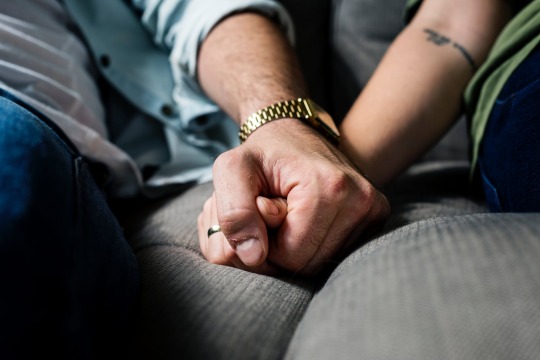
Cook and eat together
While schedules can get tight and chaotic when families are dealing with addiction-related appointments, a family meal gets the family reconnected at the end of the day. The ritual of eating together is soothing and builds upon the work done in family therapy.
Manage expectations
Once an addict is in treatment and the family begins to heal themselves, the sense of hope becomes overwhelming. However, it takes time for changes and patterns linked to addiction to really change. The slow shift causes disappointment.
For example, holidays can be full of fights because a family may not be ready to accept an addict back into a celebration with open arms.
Recovery is a lifetime long process and it can come with pitfalls.
Stay in touch with personal joy
Every member of a recovering family needs to take time to do something relaxing and fulfilling. They should participate in actives that make them feel happy. Hobbies preserve a sense of efficacy and worth, all while boosting mental health.
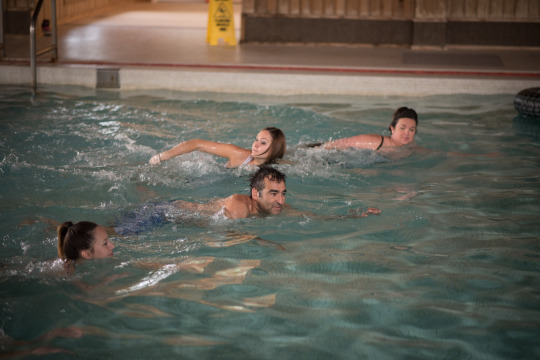
Related Links
4 Ways for Talking to Someone Struggling with Addiction
How-To Guide: The Steps of Getting into an Addiction Treatment Program
4 Things That Parents with Addicted Kids Need to Know
5 Tips for Mothers of Adult Addicts
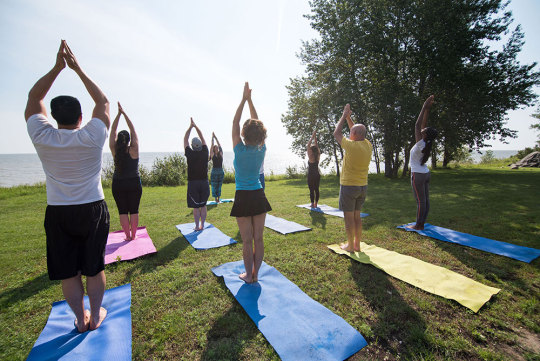
Aurora Recovery Centre’s philosophies are consistently reflected in the way we value our members and staff. Everything we do is in the interest of our members’ recovery for life.
Why Aurora
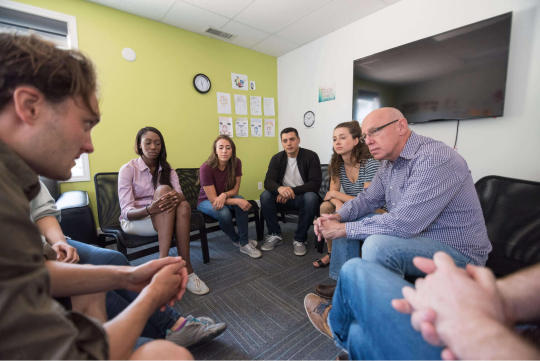
Aurora’s treatment process is built upon a member-first culture and stands on three pillars that reflect our philosophy toward our members’ recovery: Heal, Connect and Recover.
Treatment Process

Our modern world-class facilities are located on the serene western shore of Lake Winnipeg, accompanied by miles of wooded trails and breathtaking sunrises, with amenities that support healing.
Facilities
Learn more about our program by talking to an addiction specialists.
Fill out the form below and one of our specialists will be in touch soon, or call 1.888.544.5023 for immediate assistance.
[contact-form-7]
from https://www.aurorarecoverycentre.com/questions-answers/9-tips-to-help-family-members-of-addicts-cope/
source http://aurorarecoverycentre1.weebly.com/blog/9-tips-to-help-family-members-of-addicts-cope
0 notes
Text
9 Tips to Help Family Members of Addicts Cope
9 Tips to Help Family Members of Addicts Cope
Families are a huge part in the recovery of an addict. But as much as they are rooting for the addict, the loved ones also need to take time for themselves.
Many questions arise for the loved ones of someone struggling with an addiction. How to you deal with the addict? How can I find support groups of families of addicts? Can I help the parents?
These questions allow some resolution for family members and friends. But they still need to take care of their own health.
Here are nine tips that can help families cope with an addict.

Learn about addiction
Every day, research teams learn more about how different substances interact with the cells inside the brain. They use that knowledge to develop new treatments that may treat or prevent actions.
Knowing that boosts a family’s sense of hope. With each fact families learn and become more confident that the addiction can be treated and conquered.
Education also decreases the chances of the family playing the blame game. Instead of thinking that the person’s addiction is a result of being weak, stubborn, or unwilful, they may learn how addictions stem from deeper mental, physical, and emotional issues.
Connect with others
An addiction in a close relative can be a stressful life situation that persists for years. This long-term dysfunction makes it hard for families to communicate clearly. On top of that, there is a lot of mistrust between each member touched by addiction.
Connecting with other people who have gone through a similar situation helps. Treatment programs such as our Group Family workshops provide a safe, nonjudgmental space for people to use in order to learn, discuss, and overcome an addiction.
Go to Family Therapy
Spouses, siblings, and parents of addicts often absorb many of the consequences of a life altering addiction. Most times families become distant and are unable to talk openly about the issue harming them, resulting in them not talking about much of anything. Family members start to blame themselves because the addiction is still active, even though they want it to stop.
Usually, families don’t have the tools to assist someone in active recovery, nor do they have the energy to help themselves.
Family therapy breaks down distrust, guilt, and stress. The anger and addiction that fueled the family transform into close, well-equipped units of support. Family therapy takes time; however, the work is vital to everyone’s health. Learn more about our group family therapy sessions here.

Exercise
Exercise reduces stress and depression. Stretching prompts the brain to release pleasure chemicals, while more intense exercises help families vent since their energy is shifted from being angry at each other to focusing on staying fit.
Schedule private therapy sessions
Addictions cause deep rifts and wounds in everyone that can only be healed by therapy. Meeting with a counselor individually allows people to overcome and understand their personal issues or struggles.
Private therapy typically follows a skills-based format where caregivers learn more about how to deal with destructive thoughts and habits develops over the duration of addictive behavior, which results in a family member being able to help themselves and others.
Educate and advocate
Stress and depression stems from many different sources. Family members feel attacked by friends, coworkers, and distant relatives due to the stigma surrounding addictions. It’s hard to stay positive with terms and gossip that is demeaning but advocating on behalf of addiction is brave and health-affirming. Rather than staying silent and fuming, families who speak up are doing something to make things better, change conversations, and create a strong bond.
If you are in need of some counselling, contact us today.
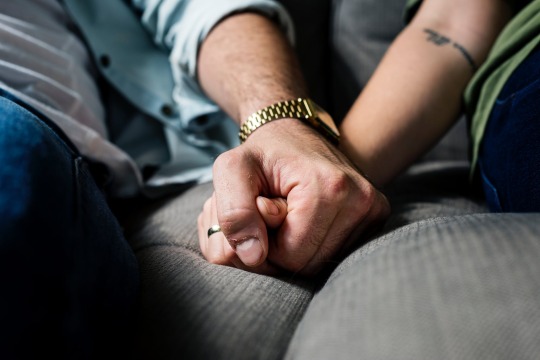
Cook and eat together
While schedules can get tight and chaotic when families are dealing with addiction-related appointments, a family meal gets the family reconnected at the end of the day. The ritual of eating together is soothing and builds upon the work done in family therapy.
Manage expectations
Once an addict is in treatment and the family begins to heal themselves, the sense of hope becomes overwhelming. However, it takes time for changes and patterns linked to addiction to really change. The slow shift causes disappointment.
For example, holidays can be full of fights because a family may not be ready to accept an addict back into a celebration with open arms.
Recovery is a lifetime long process and it can come with pitfalls.
Stay in touch with personal joy
Every member of a recovering family needs to take time to do something relaxing and fulfilling. They should participate in actives that make them feel happy. Hobbies preserve a sense of efficacy and worth, all while boosting mental health.
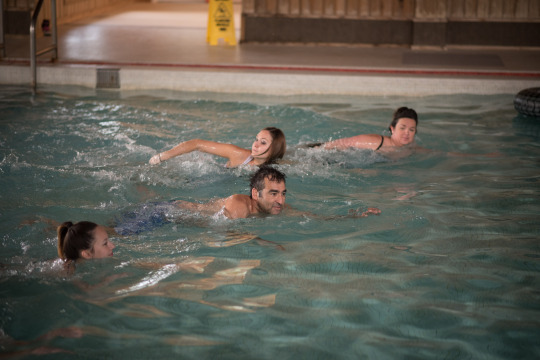
Related Links
4 Ways for Talking to Someone Struggling with Addiction
How-To Guide: The Steps of Getting into an Addiction Treatment Program
4 Things That Parents with Addicted Kids Need to Know
5 Tips for Mothers of Adult Addicts
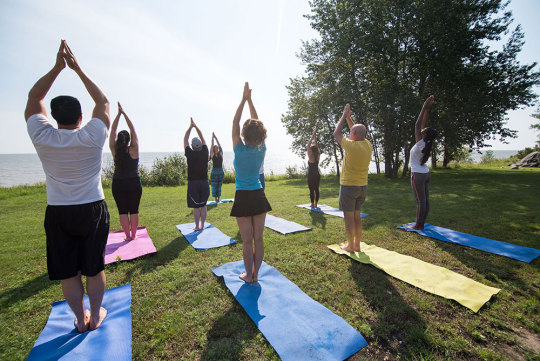
Aurora Recovery Centre’s philosophies are consistently reflected in the way we value our members and staff. Everything we do is in the interest of our members’ recovery for life.
Why Aurora
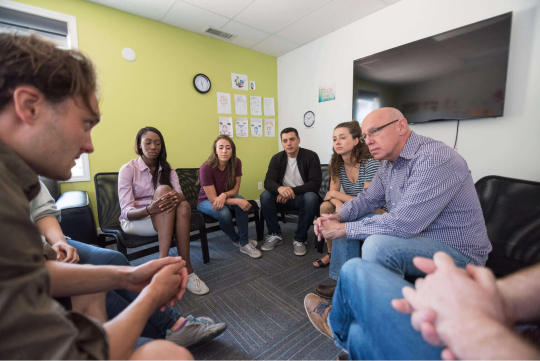
Aurora’s treatment process is built upon a member-first culture and stands on three pillars that reflect our philosophy toward our members’ recovery: Heal, Connect and Recover.
Treatment Process

Our modern world-class facilities are located on the serene western shore of Lake Winnipeg, accompanied by miles of wooded trails and breathtaking sunrises, with amenities that support healing.
Facilities
Learn more about our program by talking to an addiction specialists.
Fill out the form below and one of our specialists will be in touch soon, or call 1.888.544.5023 for immediate assistance.
[contact-form-7]
from Aurora Recovery Centre https://www.aurorarecoverycentre.com/questions-answers/9-tips-to-help-family-members-of-addicts-cope/ source https://aurorarecoverycentre1.tumblr.com/post/183296613149
0 notes